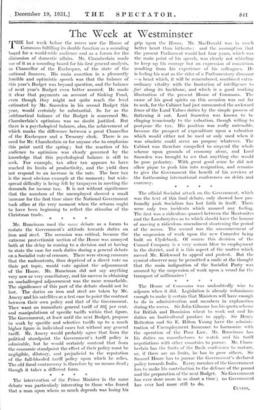Mr. Runeiman used the same debate as a forum to
restate the Government's attitude towards duties on iron and steel. The occasion was critical, because the extreme protectionist section of the House was annoyed both at the delay in coming to a decision and at having to state the case for such duties during a general debate on a Socialist vote of censure. There were strong rumours that the malcontents, thus deprived of a direct vote on their pet topic, would vote against the adjournment of the House. Mr. Runciman did not say anything very new or very conciliatory, and his success in obtaining an unchallenged adjournment was the more remarkable. The significance of this part of the debate should not be lost. The duties on iron and steel are taken by Mr. Amery and his satellites as a test ease to point the contrast between their own policy and that of the Government. They want an immediate general tariff of 834 per cent. and manipulations of specific tariffs within that figure. The Government, at least until the next Budget, propose to work by specific and selective tariffs up to a much higher figure in individual cases but without any general tariff. Mr. Amery would probably agree that from the political standpoint the Government's tariff policy is admirable, but he would certainly contend that from the economic standpoint the effect of their policy must be negligible, dilatory, and prejudicial to the reputation of the full-blooded tariff policy upon which he relies. The old fiscal controversy is therefore by no means dead ; though it takes a different form.


































 Previous page
Previous page